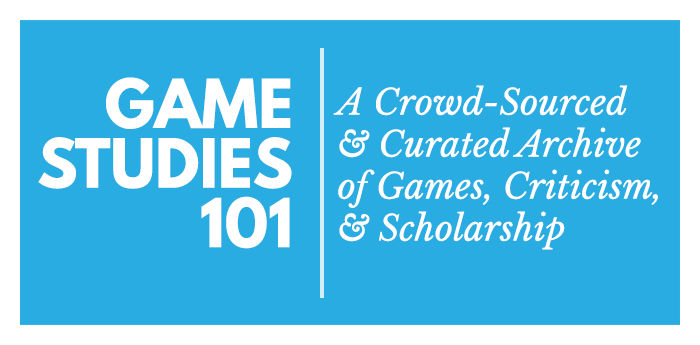GAME STUDIES 101

Game Studies 101 is an online archive of games, criticism, and scholarship. The content is crowdsourced and curated by volunteers who research games from various perspectives and disciplines. Entries are annotated and categorized by genre, then cross-listed between academic fields to facilitate exploration and collaboration. GS101 was designed to embrace the multidisciplinary, multi-organizational, and multi-national nature of game studies, therefore it is continually growing and the content reflects discourses that span disciplines, campuses, organizations, and nations.
GS101 was founded by Steve Wilcox while he was doing his English PhD at the University of Waterloo, working from the Games Institute. He remains the Editor-in-Chief/Managing Editor. Wilcox has support from a team of curators who are also alum of the GI: Alice Bao is the Environmental Studies Curato, Dean Mizzi is the Human Geography Curator, Michael Hancock is the Game Studies Curator, and Ryan Clement is the Purposeful Games Curator. Dr. Neil Randall, executive director of the GI, is the Academic Advisor for the project.
GS101 was initially composed of articles, books, and games that curators compiled during their own research and graduate studies. As GS101 grew and added more curators, the content of the archive became more expansive and diverse. The archive strives to be representative rather than exhaustive, though readers are encouraged to supplement the selection of entries with suggestions for new content. This decision reflects the fact that GS101 is run by volunteer curators as well as the very nature of game studies as an emergent, rapidly-growing field. Users or visitors to the site contribute to the archive by commenting on articles, games, and resources. As users share their opinions and link to further reading, the comments develop the GS101 ecosystem.
The GS101 team identifies four broad groups that the site appeals to: game scholars, designers, journalists, and enthusiasts. However, the actual users might look different considering anyone interested in games or the vast potentials of the field of game studies can access the archive and benefit from the content. Visitors might be students, instructors, players, game designers, and organizations, as well as less obvious users like Health Care professionals, Human Resource managers, and activists – and any other person curious about some facet or nuance of games.
